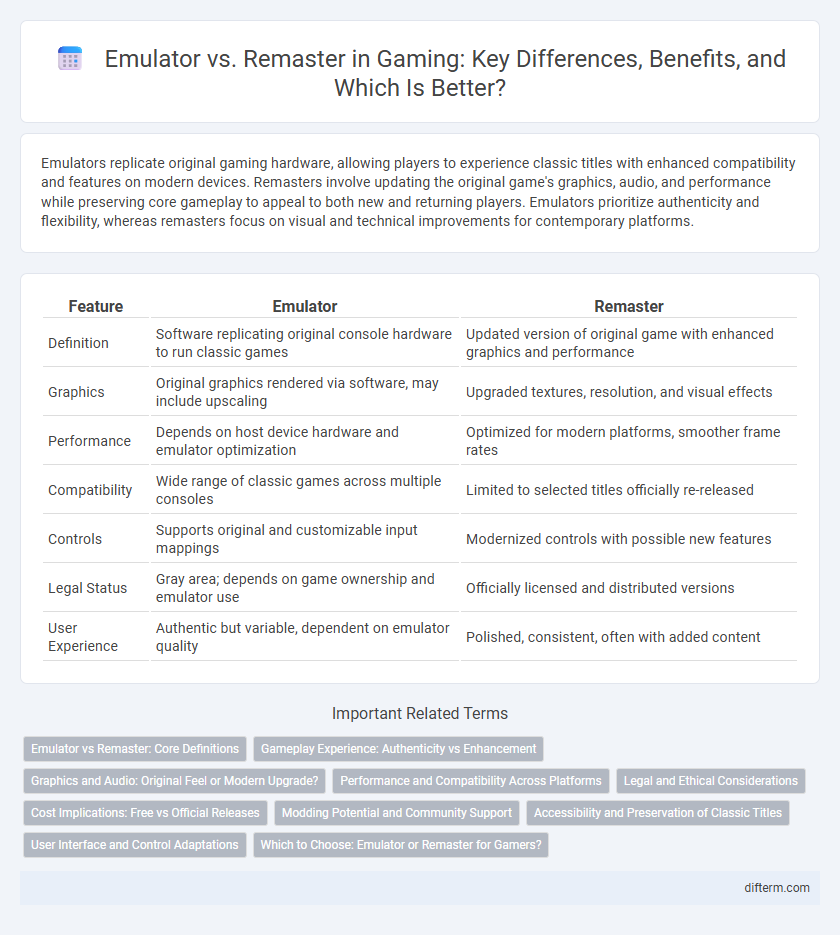Emulators replicate original gaming hardware, allowing players to experience classic titles with enhanced compatibility and features on modern devices. Remasters involve updating the original game's graphics, audio, and performance while preserving core gameplay to appeal to both new and returning players. Emulators prioritize authenticity and flexibility, whereas remasters focus on visual and technical improvements for contemporary platforms.
Table of Comparison
| Feature | Emulator | Remaster |
|---|---|---|
| Definition | Software replicating original console hardware to run classic games | Updated version of original game with enhanced graphics and performance |
| Graphics | Original graphics rendered via software, may include upscaling | Upgraded textures, resolution, and visual effects |
| Performance | Depends on host device hardware and emulator optimization | Optimized for modern platforms, smoother frame rates |
| Compatibility | Wide range of classic games across multiple consoles | Limited to selected titles officially re-released |
| Controls | Supports original and customizable input mappings | Modernized controls with possible new features |
| Legal Status | Gray area; depends on game ownership and emulator use | Officially licensed and distributed versions |
| User Experience | Authentic but variable, dependent on emulator quality | Polished, consistent, often with added content |
Emulator vs Remaster: Core Definitions
Emulators replicate original gaming hardware through software, enabling players to run classic games on modern devices with accuracy and preservation of the original experience. Remasters involve updating the original game's visuals, audio, and sometimes gameplay mechanics to suit contemporary hardware, enhancing the game while maintaining its core identity. Both approaches serve to revive classic games, but emulators focus on faithful reproduction, whereas remasters emphasize improved presentation and accessibility.
Gameplay Experience: Authenticity vs Enhancement
Emulator gameplay emphasizes authentic replication of original titles, preserving exact mechanics, visuals, and controls for nostalgic accuracy. In contrast, remasters enhance gameplay by upgrading graphics, refining controls, and sometimes adding new features, aiming to improve accessibility and modern user experience. The choice between emulator and remaster hinges on prioritizing pure authenticity or embracing improved functionality and visual fidelity.
Graphics and Audio: Original Feel or Modern Upgrade?
Emulators replicate the original gaming experience by preserving authentic graphics and audio, enabling players to enjoy classic titles with their native visuals and sound quality, often including support for higher resolutions and enhanced audio fidelity. Remasters overhaul the original assets, offering modernized graphics, refined textures, and reorchestrated soundtracks that elevate audiovisual appeal while retaining core gameplay elements. Choosing between emulator and remaster depends on whether gamers prioritize faithful reproduction or enhanced sensory immersion through contemporary upgrades.
Performance and Compatibility Across Platforms
Emulators offer broad compatibility by replicating original hardware environments, enabling games to run across multiple platforms with near-native performance depending on the emulator's optimization and the host system's capabilities. Remasters enhance performance by leveraging modern hardware and software improvements, providing higher resolution, faster load times, and refined graphics, but are limited to officially supported platforms. Choosing between emulators and remasters depends on the priority of preserving original gameplay fidelity versus utilizing modern enhancements for performance and visual quality.
Legal and Ethical Considerations
Emulators operate in a legal gray area as they often rely on copied BIOS or game files without explicit permission, raising concerns about intellectual property rights and copyright infringement. Remasters, on the other hand, are officially sanctioned by original developers or publishers, ensuring legality and ethical compliance in preserving and enhancing classic games. Ethical considerations prioritize supporting creators by purchasing remastered versions rather than distributing or using unauthorized emulated copies.
Cost Implications: Free vs Official Releases
Emulators offer a cost-effective way to play classic games by enabling free access to original game files without additional charges, appealing to budget-conscious gamers. Official remasters, while often priced higher, provide enhanced graphics, optimized performance, and ongoing developer support, justifying their premium cost for a polished experience. The financial choice between emulators and remasters hinges on balancing free accessibility against the value of quality improvements and legitimate purchase.
Modding Potential and Community Support
Emulators offer extensive modding potential by allowing players to customize game files, integrate cheats, and enhance graphics through community-created patches, fostering a vibrant ecosystem for game modifications. Remasters generally provide limited modding capabilities due to locked assets and proprietary tools, but benefit from official updates and optimized performance supported by the development team. Strong community support in emulators often drives continuous improvements, while remasters rely on both fan enthusiasm and developer resources to sustain longevity.
Accessibility and Preservation of Classic Titles
Emulators enhance accessibility by enabling gamers to play classic titles across diverse devices without original hardware, preserving gameplay experience through accurate software replication. Remasters improve preservation by updating graphics and performance while maintaining core mechanics, making classic games appealing to modern audiences with contemporary hardware compatibility. Both approaches contribute to the longevity of gaming history, balancing authenticity and usability for new generations.
User Interface and Control Adaptations
Emulators replicate original gaming hardware, allowing users to experience classic games with customizable control mapping and modern input devices, preserving the authentic interface while enhancing accessibility. Remasters redesign user interfaces to fit contemporary standards, often introducing streamlined menus, updated HUDs, and control schemes optimized for current consoles or PCs. User experience in remasters emphasizes intuitive navigation and responsiveness, whereas emulators prioritize faithful control behavior with flexible configuration options.
Which to Choose: Emulator or Remaster for Gamers?
Emulators replicate original gaming hardware to run classic titles on modern devices, offering authentic experiences with customizable settings but potential performance issues. Remasters enhance older games with improved graphics, sound, and gameplay tweaks, providing a polished experience optimized for current platforms. Gamers should choose emulators for nostalgia and authenticity or remasters for enhanced visuals and smoother gameplay.
Emulator vs Remaster Infographic

 difterm.com
difterm.com